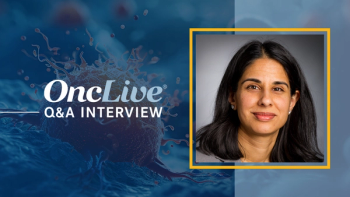
Dr Meric-Bernstam on the Use of Trastuzumab Deruxtecan in HER2+ Solid Tumors

Funda Meric-Bernstam, MD, discusses the phase 2 DESTINY-PanTumor02 trial of trastuzumab deruxtecan in difficult-to-treat HER2-positive solid tumors.
Funda Meric-Bernstam, MD, chair, the Department of Investigational Cancer Therapeutics–the Phase I Program, medical director, the Institute for Personalized Cancer Therapy (IPCT), the Nellie B. Connally Chair in Breast Cancer, the University of Texas MD Anderson Cancer Center, discusses the phase 2 DESTINY-PanTumor02 trial (NCT04482309) of fam-trastuzumab deruxtecan-nxki (Enhertu) in difficult-to-treat HER2-positive solid tumors.
The ORR in the total population of the 267 patients was 37.1%, including a complete response rate of 5.6%. Moreover, the overall median DOR reported was 11.8 months. In patients with cervical (n = 40), endometrial (n = 40), ovarian (n = 40), biliary tract (n = 41) pancreatic (n = 25), bladder (n = 41), and other cancers (n = 40) the ORRs were 50.0%, 57.5%, 45.0%, 22.0%, 4.0%, 39.0%, and 30.0%, respectively.
The cohort where patients experienced the least amount of activity with trastuzumab deruxtecan was pancreatic cancer, Meric-Bernstam continues. However, this was not a surprising results since pancreatic cancer is a traditionally difficult disease to treat, Meric-Bernstam says. Notably, patients in the pancreatic cancer cohort experienced a stable disease rate of 68%, Meric-Bernstam concludes.



































